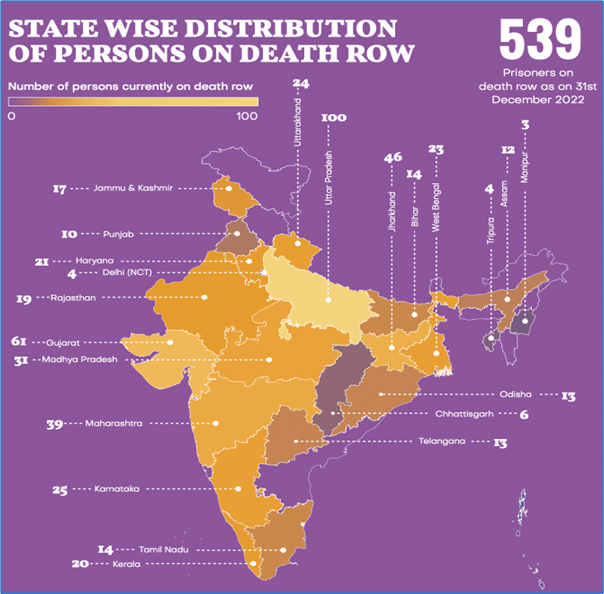Why in News?
- According to the ‘Death Penalty in India: Annual Statistics’ Report for the year 2022, the Trial Courts sentenced 165 people to death in 2022.
What’s in today’s article?
- Death Penalty in India Report (Major highlights from 2022 Report)
- Legal Remedies for Prisoners on Death Sentence
- Arguments in favour/against Death Penalty
- Important Judgements on Death Penalty
Death Penalty in India Report:
- Death Penalty in India Report is published by Project 39A.
- Project 39A is a criminal law reforms advocacy group at the National Law University, Delhi.
- It is inspired by Article 39A of the Constitution of India.
- Article 39A of the Constitution of India provides for free legal aid to the poor and weaker sections of the society and ensures justice for all.
- The article was inserted by the 42nd Amendment Act of 1976

Major Highlights of the Death Penalty in India Report 2022:
- The trial courts across the country imposed 165 death sentences in 2022, which is the highest in a single year in the last two decades.
- Also, 539 prisoners were on death row by the end of 2022, which was the highest since 2016.
- The large death row population signals the continued imposition of a high number of death sentences by trial courts with a low rate of disposal by appellate courts.
- The highest number of people on death row were in the states of Uttar Pradesh (100), Gujarat (61), Jharkhand (46), Maharashtra (39) and Madhya Pradesh (31), the report said.
Legal Remedies Available to Death Sentenced Individuals:
- The award of the death sentence by a trial court must be reaffirmed by a High Court to make it final.
- Article 137 of the Indian Constitution provides the power to the Supreme Court to review the orders and judgments passed by it.
- The Review Petition can be filed under Section 114 and Order 47 of the Code of Criminal Procedure (CrPC).
- After the dismissal of the review petition, the person can file Curative Petition.
- Petitioners can file curative petitions in case of gross violation of principles of natural justice.
- The curative petition will be sent to the three senior most judges and the bench of judges who passed the judgment.
- If the majority of them find substance in the petition, then the matter would be sent to the same bench of judges.
- Mercy Petition can be filed by the convicts. It is to be filed within a period of seven days from the date when the Superintendent of jail informs the convicted person of the dismissal of the petition.
- Article 72 and Article 161 of the Constitution provides the power to pardon the petitioner to the President and the Governor, respectively.
Arguments in Favour/Against of Death Penalty:
- Moral arguments:
- Supporters of the death penalty believe that those who commit murder, because they have taken the life of another, have forfeited their own right to life.
- Furthermore, they believe, capital punishment is a just form of retribution, expressing and reinforcing the moral indignation not only of the victim’s relatives but of law-abiding citizens in general.
- Counter argument: Opponents of death penalty argue that, by legitimizing the very behaviour that the law seeks to repress—killing—capital punishment is counterproductive in the moral message it conveys.
- Utilitarian arguments:
- Supporters of capital punishment also claim that it has a uniquely potent deterrent effect on potentially violent offenders for whom the threat of imprisonment is not a sufficient restraint.
- Counter argument: Opponents, however, point to research that generally has demonstrated that the death penalty is not a more effective deterrent than the alternative sanction of life or long-term imprisonment.
Important Judgements on Death Penalty:
- Ediga Anamma v/s State of Andhra Pradesh (1974):
- The Supreme Court laid down the principle that life imprisonment for the offence of murder is the rule and capital sentence is the exception in certain cases.
- The Court also stated that a special reason should be given if the court decides to impose a death sentence.
- Bachan Singh v/s State of Punjab (1980):
- The Supreme Court held that only in rarest of rare cases that are brutal, the death penalty should be imposed.
Recent Legislative Developments:
- In 2021, Punjab and Madhya Pradesh introduced the death penalty for causing deaths by spurious liquor.
- Maharashtra introduced death penalty for 'heinous' offences of rape and gangrape.
- The Union Ministry of Women & Child Development also introduced a Bill proposing the capital punishment for repeat aggravated trafficking offences involving children and women.










